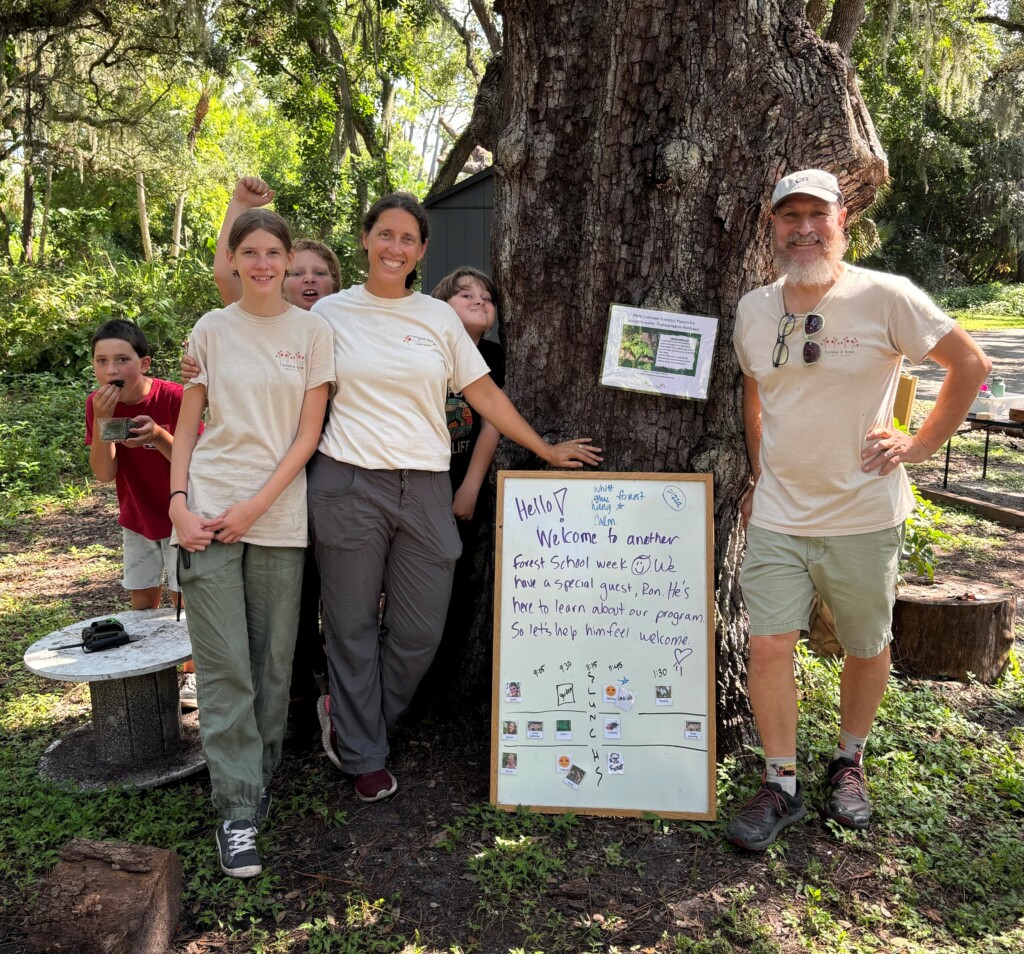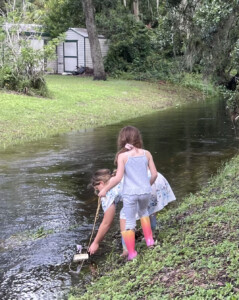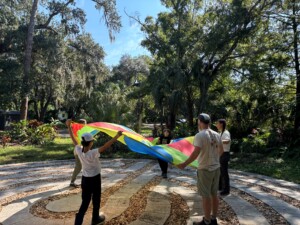
Justine Wilson, front row, center, and her husband, Chris Trammel, right, established Curious and Kind as a forest school for part-time, student-directed learning.
SARASOTA, Fla. – After 18 years as an educator in public and private schools, Justine Wilson decided to make a change. She was excellent at her job. In fact, she had just been offered a top administrative position at a top private school. But she didn’t believe mainstream approaches to teaching and learning were the best ones for many students, or for herself.
“I was saying things and doing things that weren’t who I actually was as an educator. I kept getting more and more away from my core beliefs,” Wilson said. “I just wanted to be authentic.”
Wilson wanted:
With the help of Florida’s education choice programs, Wilson did what more and more former traditional educators are doing: She created her own option: a nature-based, student-directed, hybrid homeschool called Curious and Kind Education.
“I love offering something that brings me the most joy,” Wilson said. “Which is being outside with the kids and partnering with their families.”
Curious and Kind offers different programs for different age groups, from toddlers to teenagers. Depending on the program, families can enroll their “explorers” one, two, or three days a week.
Plenty of families love this approach. Curious and Kind started last year with 25 students. This year, it has 90. Nearly all of them use choice scholarships, particularly the Personalized Education Program (PEP) scholarship, an education savings account (ESA) in its second year of existence.
Curious and Kind rents space from a church, but its heart is out back: a two-acre patch of unruly, urban forest, next to a creek that flows from a nature park across the street.
One day last month, 20 explorers ages 5 to 12 took seats on a set of cut logs, arranged in a circle beneath oaks, pines, and palms. Then they got down to business, discussing what they’d like to do over the next few hours. Crochet. Whittle. Make a pizza. Whatever the idea, Wilson and other “facilitators” gently offered suggestions on tools and timing and possible collaborations.
“Our philosophy is ‘Yes. And how do we make it happen?’ “Wilson said.
By early afternoon, most of the explorers had circled back to what they wanted to work on. (Because Curious and Kind didn’t have the ingredients on hand, the pizza had to wait until later in the week.) But first, it was time to play in the woods.
Within minutes, the explorers were building tree forts, making “tea” in a mud kitchen, and trying to identify a species of pseudo-scorpion they found on a slash pine.
At Curious and Kind, play routinely leads to projects.
When the creek was a bit too high for wading, somebody suggested the explorers build little boats instead. (It’s not clear if the idea came from an explorer or a facilitator. “It could have been anybody,” Wilson said. “It’s very democratic.”)

Students try out their homemade boats.
Ice pop sticks and masking tape were on hand. So were twigs and leaves and pine straw. The explorers gave it their best shot, and the initial results were … meh. They pulled their boats from the water to tweak their designs.
The next day, they tried again. This time, they incorporated wine corks that one of the facilitators brought in, plus sturdier and more water-resistant packing tape. This time, they found more success.
“This is what children do when they’re left to their own devices. Humans do this innately,” Wilson said. “They were failing forward, because it was fun.”
The project was also fun because it was theirs.
Agency matters. In one of the classrooms, explorers established their own mini mall. One of them set up a face-painting booth. Another created a line of glittery fingernails. Another manufactured mystery gift boxes, each with its own origami surprise. They even created their own bank, currency, and credit cards.
Wilson quickly suggested the students host a community fair, but “They were like, ‘Why would we want to do that?’ It wasn’t the right time.”
A few weeks later, Wilson pitched the idea again, this time because the Children’s Entrepreneur Market was coming to Sarasota. This time, the students were pumped.
In Florida, the state that’s leading the nation in reimagining public education, Curious and Kind is “school,” too.
It bills itself as a blend of the forest school and Agile Learning Center models. That may not be “traditional” education to some folks, but it has deep roots in thoughtful, alternative approaches.
“We believe in recognizing the innate curiosity of kids and fostering that,” said Chris Trammel, who is Justine’s husband, the director of operations at Curious and Kind, and likewise a longtime educator in public and private schools. “If you’re following your passions, you’re going to take ownership of your learning.”
Curious and Kind represents a number of other choice-driven trend lines.
The “hybrid” schedule is catching on. Florida’s homeschooling population has skyrocketed in recent years, as it has across the country, and more homeschooling families are opting for part-time schools.
Curious and Kind is on the cutting edge of “a la carte learning,” too. Thanks to the flexibility of ESAs, —which can be used for a range of educational expenses, not just private school tuition — more and more parents are choosing from multiple providers.
 In Florida, the primary vehicle for that, the PEP scholarship, can serve up to 60,000 students this year, up from 20,000 last year. Thousands of students are also using another Florida ESA, the Family Empowerment Scholarship for Students with Unique Abilities, in a similar fashion.
In Florida, the primary vehicle for that, the PEP scholarship, can serve up to 60,000 students this year, up from 20,000 last year. Thousands of students are also using another Florida ESA, the Family Empowerment Scholarship for Students with Unique Abilities, in a similar fashion.
Carolina King’s daughters, Camila, 11, and Giuliana, 9, are among them. Both have special needs that would make it more challenging for them to thrive in traditional schools, said King, who writes a popular blog about parenting and child development.
King believes the student-directed approach is ideal for instilling a lifelong love for learning. Before the family moved to Florida in 2021, Camila and Giuliana attended a Montessori school. When a similar school didn’t pan out after the move, King turned to homeschooling and soon found Curious and Kind.
“They love it there. When the school year was over, they were so sad,” King said. “They said they never want to do summer again.”
King said features big and small make Curious and Kind special. The kids eat and use the restroom whenever they want. Different ages interact with each other. There’s no bullying. More than anything, King can see her daughters pursuing what excites them and learning deeply in the process.
Last year, Camila helped write a Halloween play that the kids performed for each other. She came up with the original idea. Other kids contributed to the script. Still more took on acting roles. Some were so engaged, they worked on the project at home.
“A lot of what happens is a snowball effect,” King said. “The kids feed off each other.”
Curious and Kind and similar alternatives might not be right for every family. But as choice in Florida has expanded, more and more have been flocking to them.
“People have a diversity of interests,” Wilson said. “We should have a diversity of options.”